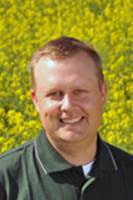
By Travis Peardon, Regional Livestock Specialist, Outlook Regional Office
Monitoring your herd closely during this time will ensure that you avoid any problems.
Grazing as late into the fall as possible is a great way to cut down on winter feed costs for cattle producers. Every day that the grazing season is extended, is one less day of providing feed for your cow herd. Although extending the grazing season is a great way to reduce feed costs it does come with some risks and management challenges.
Bloat is a common concern at this time of year if producers are grazing regrowth on alfalfa fields. After a frost the cell walls in the alfalfa plant rupture and increase the release of soluble protein in the plant increasing the chances of bloat in cattle. If a frost occurs when cattle are grazing alfalfa, cattle should be pulled immediately. Producers need to wait a minimum of seven days or longer after a frost or freeze before putting cattle back on the field. This should allow the plant to start drying down reducing the risk of bloat. Likewise, if it was not a complete killing freeze and just a light frost, each subsequent frost or freeze needs to be monitored for additional plant damage.
Grazing stubble fields is another way to extend the grazing season. This allows cattle to make use of grass in sloughs, along fence lines and other areas that were not cropped as well as straw and chaff. Caution must be exercised when grazing fields with crop regrowth. Lush regrowth of volunteer cereals pose a risk of nitrates after a frost. Nitrates are a form of nitrogen easily absorbed by the plant from the soil. Once absorbed it is transferred through the stem to the leaves where it is converted into amino acids and proteins. The plant needs these compounds for growth and seed production. When a frost occurs, the leaf tissue is injured and can no longer convert the nitrates to protein. This results in an accumulation of nitrates to levels that are potentially toxic to livestock. A rest period of seven to 14 days is recommended along with forage testing. Potentially hazardous nitrate levels in the plant decrease if there is leaf tissue alive to utilize the nitrates. It is difficult to know for certain when nitrates are no longer a risk to grazing livestock. For this reason it is advisable to test forages that are thought to be a nitrate risk.
Prussic acid is another grazing concern after a frost, though it affects fewer plant varieties than nitrate toxicity. Prussic acid is also known as hydrogen cyanide and is reported to be potentially lethal at levels greater that 500 parts per million (ppm). Prussic acid is formed within a damaged plant when certain naturally occurring plant compounds are degraded. Prussic acid toxicity occurs most commonly in sorghum and related plant varieties, white clover, vetches, as well as in brassica plant species (i.e. mustard and canola). Prussic acid toxicity is worse with younger plants. Animals should be taken out of potentially harmful pastures after a frost for a period ranging between three to 10 days depending on the plant type, maturity and severity of the frost.
Cattle grazing canola regrowth may be ingesting large amounts of sulphur which can cause issues. Excess sulphur will have negative effects on herd performance including sulphur toxicity and polioencephalomalacia (PEM) or polio. PEM can cause cattle to experience blindness, lethargy, seizures and possibly death. Last year cases of polio were reported from cattle grazing canola regrowth.
It is also important to remember that cattle grazing stubble fields may require additional feed supplementation. Once cattle have consumed grass from sloughs and waste areas the nutritional value of the straw and chaff being consumed will not be enough to meet the daily feed requirements. Additional protein and energy will need to be supplemented.
Minerals and vitamins must not be overlooked during the fall grazing period. This is a good time to make sure calves have good mineral status which will help them stay healthy during weaning.
Monitoring your herd closely during this time will ensure that you avoid any problems.
For more information, contact your local Ministry of Agriculture Regional Services Office or the Agriculture Knowledge Center at 1-866-457-2377.
For more articles like this, ‘Like’ the Kindersley Social Facebook page below…